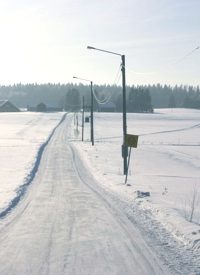
Forecasters at Britain’s national weather service are predicting another frigid winter in the Northern Hemisphere due to sunspot activity. Their recent findings, published in Sunday’s issue of the journal Nature Geoscience, show that low-level solar radiation is likely responsible for Europe’s past three harsh winters and probably holds the same in store for the upcoming season. Met Office head of Seasonal to Decadal Prediction Dr. Adam Scaife bragged, "Our research establishes the link between the solar cycle and winter climate as more than just coincidence," as reported by the Daily Mail.
On the contrary, scientists have known about the more-than-coincidental relationship for two centuries. Last month Larry Bell, professor of space architecture at the University of Houston, outlined the history in a Forbes article entitled, "Sorry, But With Global Warming, It’s the Sun, Stupid." In 1801 William Herschel correlated the number of sunspots to the price of grain in London. German astronomer Heinrich Schwabe proved the 11-year cycle of sunspot activity in 1843. Bell noted the absence of sunspots during the Little Ice Age that spanned the 17th and 18th centuries. And for the past two decades scientists have been publishing research based on the satellite record available since 1979 pointing to the overwhelming influence of solar activity on Earth’s temperature. Their research has been very unpopular with, and routinely ignored by, climate change alarmists.
Enter the highly-respected European Organization for Nuclear Research (CERN), famous for its invention of the World Wide Web in 1989 (much to Al Gore’s chagrin). CERN researchers have given Gore something else to stew about. They published an article in the August 25 issue of Nature, detailing their "Cosmics Leaving Outdoor Droplets" (CLOUD) experiment. It found that solar activity significantly impacts Earth’s temperatures. More importantly, CERN showed that none of the climate models used to generate dire warnings of global warming takes this sunspot effect into account.
Now the Met Office is making headlines with the same news. Its findings are, like CERN’s, based on satellite measurements of solar radiation, and it concluded, as CERN did, that low sunspot activity contributes to colder temperatures. So why is this news drawing attention now, less than two months after it was barely a blip on the media radar?
The significant difference between the two reports is that the Met Office believes solar activity has little bearing on global temperatures in the long run. "Low solar activity, as observed during recent years, drives cold winters in northern Europe and the United States, and mild winters over southern Europe and Canada, with little direct change in globally averaged temperature," reads the report.
In other words, the Met Office uses sunspots to explain severe winters in the midst of an era of alleged man-made global warming. CERN never claimed that sunspots exclusively account for climate change, but lead researcher Dr. Jasper Kirkby blackballed himself and the CLOUD experiment at its launch in 1998 when he predicted that the sun and cosmic rays "will probably be able to account for somewhere between half and the whole of the increase in the Earth’s temperature that we have seen in the last century."
Once the CLOUD experiment was complete, CERN Director General Rolf-Dieter Heuer admitted to Die Welt Online that he gagged the scientists involved. "I have asked the colleagues to present the results clearly, but not to interpret them," he said, adding that he thereby hoped to avoid the "highly political arena of the climate change debate."
Nevertheless, Kirkby defended the scientific method in a press release accompanying the CLOUD results. Speaking of atmospheric aerosols known to help drive global climate, he noted, "We’ve found that the vapours previously thought to account for all aerosol formation in the lower atmosphere can only account for a small fraction of the observations." Kirkby said this "big surprise" underscores the vital importance of discovering "which additional vapours are involved, whether they are largely natural or of human origin, and how they influence clouds. This will be our next job."
He probably won’t get much help from the Met Office, as its website unquestioningly attributes global warming to human activities. But perhaps its new "discovery" will improve the weather service’s poor reputation for winter forecasting. In each of the past three years the Met Office predicted mild winters, but Mother Nature broke severe weather records every time.
Science editor Dr. David Whitehouse offers little hope for an improvement in the weather service’s forecasting abilities, however. Reporting for the Global Warming Policy Foundation, he said solar activity this year is back up to 2004 levels when the Northern Hemisphere experienced mild winters. "So, if anything, the logic behind this particular piece of research points towards the Winter of 2011 being a mild one!"




